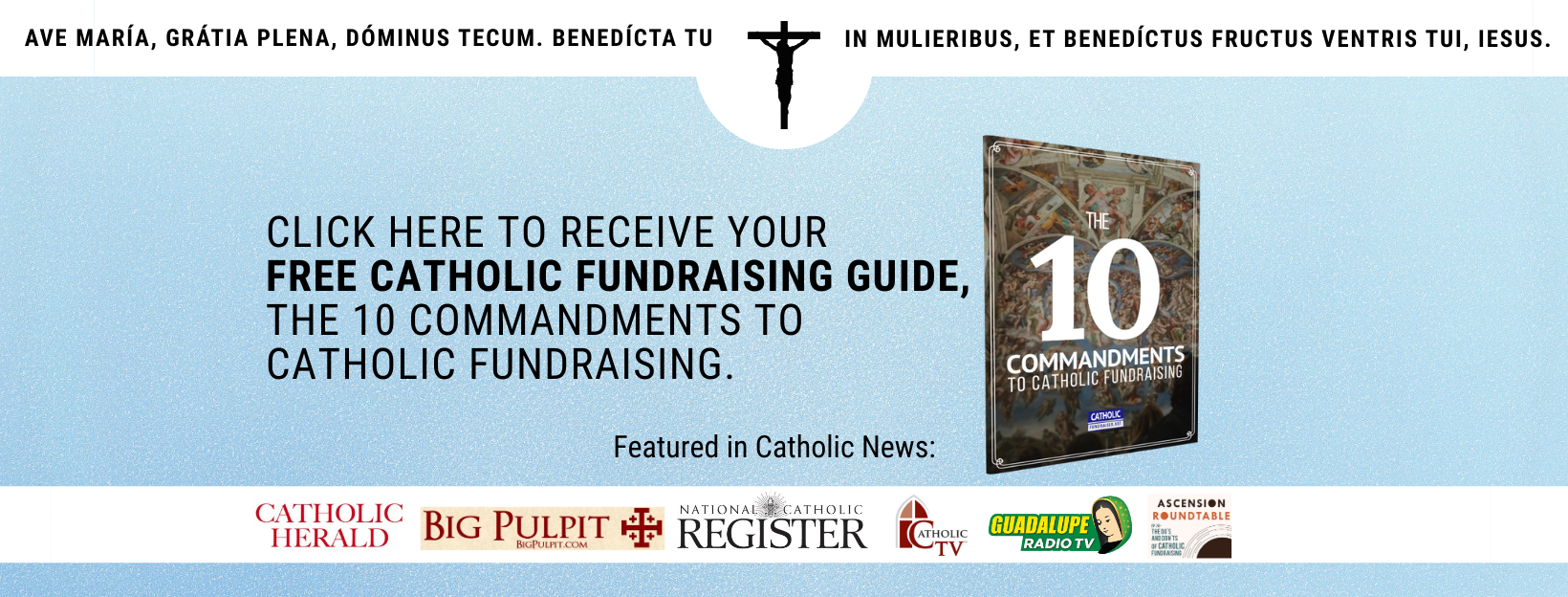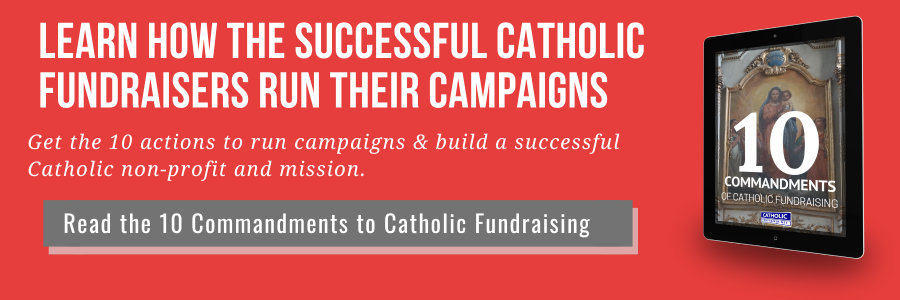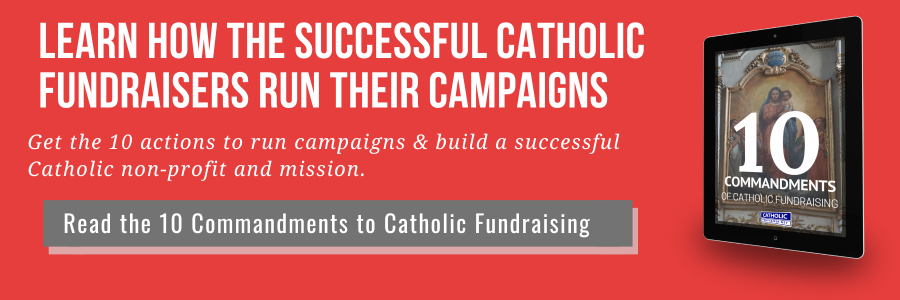A few years ago, I earned my Masters in Theology to ground my approach when it comes to fundraising.
This time learning the roots of Catholicism has helped me tremendously make the right decisions.
Take, for example, the common fundraising strategy of list-renting or list-buying. When you rent someone’s list, you can contact the list of people, but you can’t see who they are. When you buy someone’s list, you acquire the list of people and can contact them as much as you like, but you don’t know who’s on the list in advance.
Therefore, the question is, should you be buying or renting lists?
I’ve thought about it a lot, and here’s my response.
Listen to the audio version of this article
On the move? I’ve got you covered! Listen to the audio podcast of this article by clicking the link below and stream this article and many more right on your phone. Subscribe also to the podcast on iTunes.
Listen and subscribe on Apple Podcasts, Google Podcasts, and Spotify.
Question: Which saint, Catholic document, or Church teaching has given you great advice on how to raise funds? Please leave your comment below.
Transcript
Today I’m going to share my three reasons why I think you should not (yes, should not) be using a fundraising strategy that involves list-buying, otherwise known as list renting. This is the process of using other peoples’ or companies’ lists as part of your own mailing or emailing appeal when asking for donations from people otherwise not within your “circle.”
I’m going to give you three reasons why I think such lists only support an unsuccessful strategy.
But before we do this, let me quickly introduce myself. My name is Brice Sokolowski, and I am the founder of the website, CatholicFundraiser.net, that helps Catholics all around the world with their fundraising. One of the things that I’m going to be helping you with today is this concept of list-buying. Whether you’re starting out or an experienced fundraiser looking for new strategies, my website helps Catholics understand the best ways to fundraise today, and that includes talking about list buying.
I just want to make sure that you know that there is a free guide, my ‘The 10 Commandments to Catholic Fundraising,’ available to you on my website, as well as giving you advice now in today’s discussion. Jump over to my website, CatholicFundraiser.net, plus find a link below to the guide as well. Download my free guide The 10 Commandments to Catholic Fundraising, and learn 10 things that you should be doing when it comes to fundraising. It’s based on lessons that I found to be very, very helpful when it comes to fundraising and what to do, on a day to day basis. So make sure to jump over to CatholicFundraiser.net after our discussion today and get your free copy.
Let’s dive into list buying or list renting, and should you or should you not be doing this strategy? I don’t think you should. I’m going to give you three reasons why and then some solutions. So number one, why you should not be list buying is because you don’t really know who’s on a list. Somebody might say, hey, I’ve got a list of 10,000 Catholics. Okay, well, how old is the list? Do they still live there? Are they active practicing Catholics? What does ‘having a list’ really mean? So, if you don’t really know who is on the list that is a big, big, big problem. There’s my number one reason for not using lists: you don’t know who they are.
The second reason is this whole concept of pay to play, which is, you can use the list, but usually you can use it only one or two times, and you don’t really know what’s going to happen after you’ve used it. And if you want to use the list again, you’re going to have to pay again. It’s this whole concept that, if you want to contact these people at all, you’ve got to pay upfront to use this list and so it can get very expensive because you don’t really know who the people are, and so you might not really get a great return. So that’s another reason why I don’t think you should be using lists, renting lists, or buying lists when it comes to your fundraising.
The third reason is how this whole practice plays into public concerns about security breaks, internet fraud, and identity theft. If somebody gets a letter from you and they don’t know who you are, they start getting skeptical. Like, how did they get my contact information? And all of a sudden, your organization, your Catholic apostolate, is being tied (in their mind) to something that they might already be suspicious of. So that’s a really big reason why I think you should not be using such a list. Renting lists has caused more people to become very skeptical of how their personal information is shared. And if they’re getting communication from you and they have no idea who you are, well, all of a sudden you are now on their blacklist. Who is this organization? How did they contact me? What else are they doing with my information and before you know it, and without even trying, you and your appeal have put a bad taste in their mouth that may last for a long time? So, the third reason why you should not be renting or buying lists is that they may look like a quick solution, but they come at a high price in public perception.
What’s your alternative? I really think that you should know who people are. You should be able to contact people as often as possible, and you should be able to show and demonstrate that you’re keeping their information safe and secure, and that you are not selling, buying, or renting it.
And so how do you do that? You build your own list. That’s really the only way to do it, I think.
Obviously, the temptation is there. That list could have 10,000 names on it, and you’re able to reach out to those people right now, instead of just the 50 names you’ve been asking from time and again. You might automatically think, well, I can certainly raise more support from 10,000 people than from 50 — that’s a whole lot more range to ask from. That’s not true, though. It really depends on who’s on that list, not how many. How often or how frequently you communicate with them, and the relationship that you have with them, is more valuable than blindly hitting 10,000 faceless addresses. You don’t really know who they are. You have to pay to play to blindly send them your information. And you might put a sour taste in their mouth by sending things when people don’t really know who you are. So this whole concept of huge lists renting is no comparison to a small, curated list grown organically. I’m always going to go with a small list of people that know me and my fundraising strategies really well, and I can maximize my engagement with them while also maximizing my donations.
You need to know how to do that.
That’s when you’ve got to jump over to CatholicFundraiser.net and download my free guide. Then stay in touch with me and let me continue to explain to you how a very small list grown organically is far more valuable to you and your apostolate than some generic list that you could buy anywhere. So I hope that’s been helpful. May God love you. Share this with a friend and I look forward to our next discussion on fundraising. God bless and goodbye.
Want to fundraise more for your Catholic apostolate?
Make sure to get your free copy of ‘The 10 Commandment of Catholic Fundraising’. It’s a book that highlights the ten tasks you should do to keep you focused on your mission and hit your fundraising target, every time.


